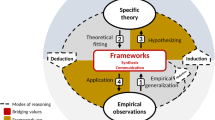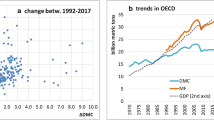Abstract
My research examines the performance of natural resource-use information systems. I question why such systems, despite receiving substantial financial and human investment, appear to have a weak impact on projects, programs, and policy intended for rural poverty alleviation in developing countries. Drawing on my understanding of the “process of unfolding” introduced by C. West Churchman, and its particular relationship to Habermasian constitutive interests, I reflect on my experiences of using the concept during fieldwork undertaken in Botswana. The concept is found useful on two fronts: first, it provides a purposeful guide for gathering and processing information/knowledge—what I have termed an epistemological intent; second, it provides a useful template for evaluating other information systems; in particular, the role of expertise—what I have termed an ontological intent. The process of unfolding, as I understand it, also provides an invitation for constructive (rather than self-indulgent) personal reflection: what might be termed a constitutive reflexive intent. By making information gathering and knowledge generation less mystical and a more transparent social activity, the conceptual and practical application of the process of unfolding can help toward retrieving inquiry as being a purposeful, openly political, and thereby less deceptive engagement: features which I believe are found particularly wanting in the business of rural development information gathering.
Similar content being viewed by others
REFERENCES
Bell, S. (1994). Methods and Mindsets: Towards an understanding of the tyrrany of methodology. Public Admin. Dev. 14(4), 323–338.
Biggs, S. (1995). Participatory Technology Development: Reflections on current advocacy and past technology development. Paper prepared for PTD workshop, The Limits of Participants, organized by Intermediate Technology, Institute of Education, Bedford Way, London.
Caplan, P. (1988a). Engendering knowledge: The politics of ethnography—Part 1. Anthropol. Today 4(5), 8–12.
Caplan, P. (1988b). Engendering knowledge: The politics of ethnography—Part 2. Anthropol. Today 4(6), 14–16.
Chambers, R. (1992). Rural appraisal: Rapid, relaxed and participatory, IDS Discussion Paper No. 311.
Chambers, R. (1993). Challenging the Professions: Frontiers for Rural Development, Intermediate Technology, London.
Chambers, R. (1997). Whose Reality Counts? Putting the Last First, Intermediate Technology, London.
Chambers, R., et al. (eds.) (1989). Farmer First: Farmer Innovation and Agricultural Research, Intermediate Technology, London.
Checkland, P. B. (1981). Systems Thinking, Systems Practice, John Wiley, Chichester.
Checkland, P. B. (1991). Towards the coherent expression of systems ideas. J. Appl. Syst. Anal. 18, 25–27.
Checkland, P. B., and Scholes, J. (1990). Soft Systems Methodology in Action, John Wiley, Chichester.
Cherrett, I. (1995). Redefining the roles of environmental NGOs in Africa. Dev. South. Africa 5(1).
Churchman, C. W. (1971). The Design of Inquiring Systems: Basic Concepts of Systems and Organizations, Basic Books, New York.
Churchman, C. W. (1979). The Systems Approach and Its Enemies, Basic Books, New York.
Devault, M. J. (1990). Talking and listening from women's standpoint: Feminist strategies for interviewing and analysis. Soc. Problems 37(1), 96–116.
Drinkwater, M. (1992). Visible actors and visible researchers: Critical hermeneutics in an actor-oriented perspective. Sociol. Ruralis 32(4), 367–388.
Farrington, J. (1995). Book Review: Beyond Farmer First (Scoones & Thompson, 1994). Agr. Res. Extens. Newslett. 31, 15–21.
Finch, J. (1984). “It's great to have someone to talk to”: The ethics and politics of interviewing women. In Bell, Co., and Roberts, H. (eds.), Social Researching Politics, Problems and Practice, Routledge & Keegan Paul, London.
Flood, R. L. (1995). What is happening when you problem solve? A critical systems perspective. Syst. Pract. 8, 215–228.
Flood, R. L. (1998). C. West Churchman. In Warner, M. (ed.), International Encyclopedia of Business Management, Thomson, London.
Flood, R. L., and Jackson, M. C. (1991a). Critical systems heuristics: Application of an emancipatory approach for police strategy towards carrying offensive weapons. Syst. Pract. 4, 283–302.
Flood, R. L., and Jackson, M. C. (1991b). Total systems intervention: A practical face to critical systems thinking. In Flood, R. L., and Jackson, M. C. (eds.), Critical Systems Thinking, John Wiley, Chichester.
Flood, R. L., and Romm, N. R. A. (1996). Contours of triple loop learning. In Forum One: Action Research and Critical Systems Thinking, University of Hull, Hull.
Flood, R., and Romm, N. R. A. (1995). Enhancing the process of methodological choice in Total Systems Intervention and improving the chances of tackling coercion. Syst. Pract. 8, 377–408.
Flood, R. L., and Ulrich, W. (1990). Conversations on critical systems thinking. In Flood, R. L. and Jackson, M. C. (eds.), Critical Systems Thinking: Directed Readings, Wiley, Chichester, pp. 185–206.
Galliher, J. F. (1980). Social scientists ethical responsibilities to superordinates: looking upwards meekly. Soc. Problems 27(3), 298–308.
Habermas, J. (1972). Knowledge and Human Interests, Heinemann, London.
Harvey, C. (1992). Botswana: Is the economic miracle over? IDS Discussion Paper 298 (Sussex University).
IIED (1988-present). RRA Notes: Sustainable Agriculture Programme, International Institute for Environment and Development, London.
Ison, R. (1993a). Changing community attitudes. Rangeland J. 15(1), 154–166.
Ison, R. L. (1993b). Soft systems: A non-computer view of decision support. In Stuth, J. W., and Lyons, B. G. (eds.), Decision Support Systems for the Management of Grazing Lands: Emerging Issues, UNESCO & Parthenon, Paris.
Levin, M. (1997b). The quest for quality in participatory inquiry—A critical reflection on quality. In Wilby, J. (ed.), Forum Two: Action Research and Critical Systems Thinking; Contributions to a Discussion Organised by the Centre for Systems Studies. June 23–25, 1997, University of Hull, Hull.
Long, N., and Long, A. (eds.) (1992). Battlefields of Knowledge: The Interlocking of Theory and Practice in Social Research and Development, Routledge, London.
Marshall, J. (1986). Exploring the experience of women managers: towards rigour in qualitative
Mosse, D. (1994). Authority, gender and knowledge: Theoretical reflections on the practice of participatory rural appraisal. Dev. Change 25(3), 497–525.
Oakley, A. (1992). Social Support and Motherhood: The Natural History of a Research Project, Blackwell, Oxford.
Oliga, J. C. (1988). Methodological foundations of systems methodologies. Syst. Pract. 1, 87–109.
Oliga, J. C. (1990). Power-ideology matrix in social systems control. In Flood, R. L., and Jackson, M. C. (eds.), Critical Systems Thinking: Directed Readings, John Wiley, Chichester, pp. 269–286.
Russell, D. B., and Ison, R. L. (1991). The research-development relationship in rangelands: An opportunity for contextual science. In Proceedings of IVth Congress International des Terres de Parcours, Montpellier, France, pp. 1047–1054.
Schecter, D. (1990). Critical systems thinking in the 1980s: A connective summary. In Flood, R. L., and Jackson, M. C. (eds.), Critical Systems Thinking: Directed Readings, John Wiley, Chichester. pp. 213–226.
Scoones, I., and Thompson, J. (eds.). (1994). Beyond Farmer First: Rural People's Knowledge, Agricultural Research and Extension Practice, Intermediate Technology, London.
Stadler, J. (1995). Development, research, participation: Towards a critique of PRA methods. Dev. South. Africa 12(6), 805–814.
Tripp, R. (1989). Farmer participation in agricultural research: New directions or old problems? IDS Discussion Paper 256 (Sussex University).
Ulrich, W. (1983). Critical Heuristics of Social Planning: A New Approach to Practical Philosophy, Haupt (John Wiley, paperback version), Stuttgart (Chichester).
Ulrich, W. (1988a). Churchman's “process of unfolding”—Its significance for policy analysis and evaluation. Syst. Pract. 1, 415–428.
Ulrich, W. (1988b). Systems thinking, systems practice, and practical philosophy: A program of research. Syst. Pract. 1, 137–163.
Ulrich, W. (1993). Some difficulties with holistic thinking. Syst. Pract. 6(6), 583–608.
Ulrich, W. (1996). A Primer to Critical Systems Heuristics for Action Researchers, University of Hull, Hull.
UNDP (1991–1996). Human Development Reports, Oxford University Press, Oxford.
Webber, L., and Ison, R. (1995). Participatory rural appraisal design: Conceptual and process issues. Agr. Syst. 47(1), 107–131.
White, S. (1996). Depoliticising development: The uses and abuses of participation. Devel. Practice 6(1), 6–15.
Wilby, J. (ed.). (1996). Forum One; Action Research and Critical Systems Thinking; Contributions to a Discussion Organised by the Centre for Systems Studies (April 29–May 1, 1996), University of Hull, Hull.
Wilby, J. (ed.). (1997a). Forum One: Action Research and Critical Systems Thinking; Transcripts and Reflections on a Discussion Organised by the Centre for Systems Studies, University of Hull, Hull.
Wilby, J. (ed.) (1997b). Forum Two: Action Research and Critical Systems Thinking; Contributions to a Discussion Organised by the Centre for Systems Studies. June 23–24, 1997, University of Hull, Hull.
Woolgar, S. (1988). Reflexivity is the ethnographer of the text. In Woolgar, S. (ed.), Knowledge and Reflexivity: New Frontiers in the Sociology of Knowledge, Sage, London.
Author information
Authors and Affiliations
Rights and permissions
About this article
Cite this article
Reynolds, M. “Unfolding” Natural Resource-Use Information Systems: Fieldwork in Botswana. Systemic Practice and Action Research 11, 127–152 (1998). https://doi.org/10.1023/A:1022925317711
Issue Date:
DOI: https://doi.org/10.1023/A:1022925317711




